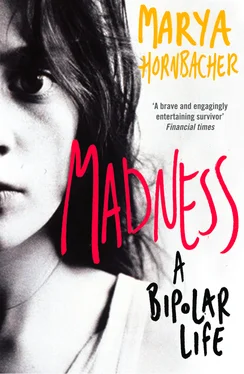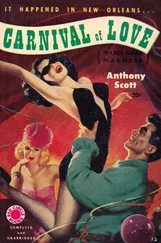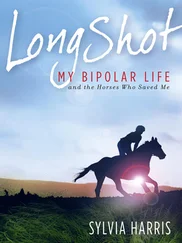1 ...8 9 10 12 13 14 ...17 I pass out.
THE FIRST CLEAR thought in years: I refuse to die .
1993
The feeling of health, as I slowly gain the sixty pounds I need to keep me alive, is foreign, weird. My body morphs as I stare at it in the mirror. I am going to stay alive. Finally I have grasped that I cannot feed my mind and starve my body to death. Finally, from somewhere, comes this visceral urge to survive. And so here I am, living. I’m working again—I’m going to school, and getting grants, and I get a job teaching undergrad classes, and I make friends, and stay up with them all night talking about books, and I’m going to parties, and learning to eat, and I suddenly have a life. A normal life. I walk tentatively through my days, afraid of breaking the spell, afraid I’ll fuck it up, I’ll fail.
Afraid I’ll go mad again, and lose it all.
1994
I am writing a poem. I am only vaguely aware of myself: the point is the poem. To the effort I contribute the mechanism of my mind: the cogs and wheels groan and begin to chug along. They move faster, sending out a conveyor belt of neatly packaged words. A story, a poem begins to take shape. Pages pile up. I scribble and gnaw on my fingers, getting blood and spit on the paper. The pages are a product of my body. I can touch them. I can eat them if I want. I worry their edges, rip at their corners, throw them to my right as I finish each one, the letters running up to the edge and spilling off onto the desk until I get another piece of paper and continue recording the automatic generation of language from my mind. As the sky outside my window turns from black to midnight blue, as thin clouds stretch across the indigo sky like someone lying on her side, I hurry: morning is almost here. I race to get down the last of the words. The light comes up. I push myself away from the desk, unclench the fist that held the pen, stagger off to bed, fall into a thick, drunken sleep.
I wake up an hour, a few hours, half a day later. I wince at the light. I am a bat. I dangle in the corner of my room, my leathery wings folded over my face. I look at the clock. Did I call in sick to work? What day is it? Do I have class? Am I teaching? Oh, Christ. I let my head fall back on the pillow and stare at the ceiling. I am silent. I do not exist. I am merely a pair of eyes, looking around at the room. The rest of me is invisible. I won’t be visible again until someone sees me. If a woman stands in a kitchen rubbing her eyes and pouring coffee with no one there to see her, does she exist? I will not register in the world until I speak.
I stumble out the door, hop the bus to the university, my head bobbling as we drive over ruts in the road, listening to the slow milling of arbitrary words around my head. The words displease me. They are not in order. Everyone is talking at once. I sit in silence, staring out the window, watching the city go by.
An hour later I find myself standing in front of a classroom with chalk in my hand. They will drop a nickel in me and I will begin to talk.
MY BODY CLOCK is completely screwed up. I’m drinking again. One minute I’m flat on my face in the living room, crying and deep in despair, the next I’m tearing back up, moving so fast my head is spinning, trying to do a million things at once, trying to keep up with the rocketing, plummeting moods.
I can’t so much as clean my apartment. My bills pile up, unpaid. The phone gets turned off. I’m so broke I’m feeding my cat cans of beans. The only things in my refrigerator are a bag of wilted carrots and beer. I guzzle coffee all day and vodka all night.
What’s wrong with me? Nothing. I’m fine. I’ve just become a lazy slob. Get ahold of yourself. Now.
But I can’t. And soon enough I snap.
1995
The cutting helps. I’m cutting every day. I stand in the bathroom, slicing patterns in my arms. They’ll scar. My arms will, for the rest of my life, be covered with scars. I clench my teeth. Cut more. Cut deeper. The thoughts stop.
The pain is perfect. It’s precise. My mind, for one blessed moment, is aware only of the pain. The pain makes me feel alive. My heart beats steadily in my chest. I picture the blood pumping through me, reaching the cuts, spilling over, running down my arms.
Morning comes. I’m passed out on the floor. I try to lift my head. A thick and pressing sadness lies on me like a dead body. I roll over on my stomach, lay my face on the floor, close my eyes. I can’t move.
By night, I feel like I’m on speed. The moods carry me up and down, up and down. I fly and fall, crashing and sailing and crashing again.
The therapist’s office: she leans back in her chair. She’s lovely, and out of her depth. She keeps increasing my Prozac. It’s making me insane.
“I don’t know what’s going on,” I say, trying to sound calm but grappling with a desperation that clutches at my chest. “I don’t think things are going very well.”
“What makes you say that?” she asks kindly, tilting her head. Sometimes her kindness gets to me. It’s excessive and saccharine, almost a parody of itself.
“I’m acting a little crazy,” I say. “One minute I’m flying around and the next I’m, you know, lying on the floor.”
“But don’t you think that’s progress? That you’re really feeling your feelings? I think you’ve finally reached a special place in your life, a place of real balance, where you’re able to fully respond to those feelings. You’re not just locked up in your head all the time, intellectualizing, pushing those feelings away .”
“Maybe,” I say, hesitant. “It just seems like maybe it’s a little much. You know, like really extreme . It seems like the feelings are taking over my entire life.”
“Well, consider this—how’s the eating going?”
“Pretty well.”
“Now, I want you to really take that in . Stop for a moment and really appreciate the significance of that. How different is that from ever before? You’ve never really been in a space where the eating disorder was under control. I feel like you’re really using the tools we’ve been working on, the mindful eating, the being in your body . You should really bear witness to the progress you’ve made in that area. I think you’ve finally, really, truly made the decision to stay alive. That’s just enormous. Can you see that? Can you be proud of yourself?”
“I’m cutting my arms up every night.”
“Have you been journaling?”
“Yes.”
“And what are you finding?”
“When I read it over, it’s like two different people are writing it. One of them’s a maniac and one of them’s completely depressed.”
“Do you think you’re depressed?”
“Not when I’m flying around.”
“I think, honestly, that you’re in much better shape than you’re giving yourself credit for. I think maybe that you are still just so angry at yourself for all the years of being sick, and so unfairly judgmental of yourself for finally breaking away from the past and finally feeling your feelings, being true to yourself, that you just aren’t allowing yourself to appreciate how well you’re really doing.”
“I really would rather not be cutting. I’m getting scars all over my arms.”
“Well, I think that’s a matter of doing some self-soothing . Have you been trying out the self-soothing techniques I suggested? Take some real time for yourself. Just sit down at night, make yourself a cup of tea, and be quiet in yourself . Wrap yourself in a warm, fuzzy quilt. Put on lotion. Splurge on some perfume. Take yourself out to lunch. Turn on some soothing music and try self-massage. Take a warm, comforting bath. Light a candle and really feel the water surrounding your limbs. Do you think you could begin tonight? Do you think you could try taking a bath?”
Читать дальше












